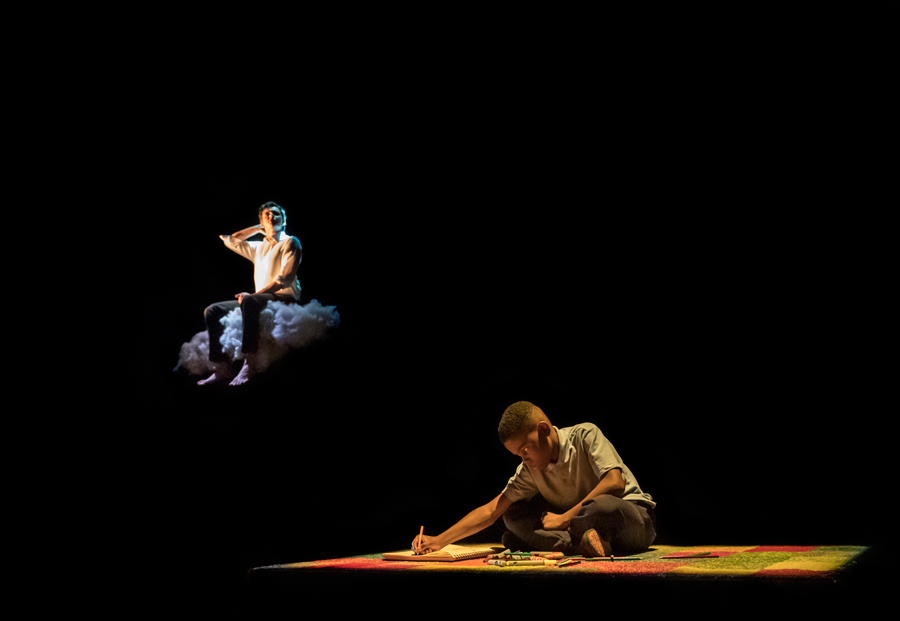Caryl Churchill Knows How to Do Things with Words
At the Royal Court, four new plays by the UK’s boldest dramatist ask urgent questions about the uses and abuses of language
At the Royal Court, four new plays by the UK’s boldest dramatist ask urgent questions about the uses and abuses of language

In late September, the Royal Court Theatre in London premiered a new quartet of plays by British playwright Caryl Churchill. For five decades now, Churchill has dramatized the mechanisms of politics and power in public and private settings, paying particular attention to how language operates in ways that transcend mere statement. With this quartet, Churchill focuses on themes of sexual violence, religious intolerance and everyday psychological malaise. In Glass, a girl made of glass interacts with friends and parents, but also with a coterie of objects including a plastic dog, clock and vase, who respond in different ways to her fragile condition. For Kill, a God sits aloft a cloud delivering a tirade about the viciousness of humans while a boy sits on the ground scribbling in a notebook and randomly interjecting words of justification and supplication.
In ‘Bluebeard’s Friends’, Churchill casts concerns raised by the #MeToo movement in a modern retelling of a 17th-century French folk tale, with four middle-aged, middle-class friends gossiping about their neighbour Bluebeard, who was recently exposed as a serial killer. The unnamed characters take turns delivering lines from a script structured like an epic poem: ‘With hindsight / all those weddings / all those failed marriages / there were always such good reasons / yes they ran off with the music teacher or went to look after their sick mother, or the schizophrenic’. It’s a ceaseless stream of voices, exploring how language is deployed to excuse and absolve.

Suddenly the theatre goes dark. As the lights come up, a clutch of books tumbles from the sky, hitting the stage with a dry slap. Strips of paper flutter like demented falling leaves. A woman is on her knees and with a great deal of effort she is cutting up books by bad men. A friend tries to stop her: she can’t do such a thing! ‘Why?’, she says. ‘What, are they people? Have they got feelings?’
It’s up for debate whether words have feelings, but they undeniably have power. There is a logic to cutting up books by hate-mongers, rapists or murderers who enjoy public prominence even once exposed. Doing so might also be a form of sympathetic magic that relieves the world of the noxious effects of certain ideologies and actions.

In his 1962 book How to Do Things with Words, the linguist J.L. Austin theorized the differences between simple statements, such as ‘the sky is blue’, and what he called performative utterances: phrases that do something in addition to stating it. ‘I apologize’ is explicitly performative, because to say it is also to enact it. The malleability of language means that the performative capacity of a statement can range from explicit to implicit, depending on who utters it and in what context. In public life and politics, the performative use of language tends to be insidious, for example through ‘dog-whistle’ messaging in which coded language is used to say one thing but mean something altogether different. Dog-whistle statements are intended to appeal to specific sectors of an audience and to ratchet up negative sentiment – or encourage action – against a particular group. Ahead of the UK’s referendum on EU membership in 2016, Boris Johnson accused President Barack Obama of ‘ancestral dislike of the British Empire’ due to his ‘part-Kenyan’ heritage. Obama had expressed his support of the UK voting to remain in the EU, but the tenor of Johnson’s accusations stymied the question at hand, and introduced a fantasy of racially motivated resentment into the discussion. More recently, while in post as Prime Minister, Johnson’s repeated reference to a bill preventing a no-deal Brexit as the ‘surrender bill’ seemed designed to appeal to the far right by invoking an imaginary war between the UK and the EU. Johnson’s coinage was instantly circulated by the far right on Twitter and across social media, which lent it additional tones of meaning depending on precisely who was retweeting. Many recognized similarities with phrases used by Thomas Alexander Mair as he murdered Jo Cox, MP for Batley and Spen in June 2016, just days before the referendum: ‘Britain first […] keep Britain independent […] This is for Britain.’ Asked to confirm his name by the court during his 2016 trial for Cox’s murder, Mair announced, ‘My name is death to traitors.’
A happier use of performative language took place on 24 September, when the President of the United Kingdom’s Supreme Court, Lady Hale, read her statement on Johnson’s decision to prorogue of Parliament on 10 September. ‘Parliament has not been prorogued,’ Lady Hale proclaimed. The prorogation ceremony, the empty chamber, the silencing of representatives – none of these had happened. Hale’s statement reintroduced process where there had been an attempt to impose a fait accompli. It brought a sharpness of intent and resolution to a forum that has grown accustomed to sloppy, larded language, malign insults and impotence. It was as if a spell had been broken.

With Imp, a family drama that revolves around metaphysical concerns, from organized religion to folk magic, Churchill looks at how language is invoked in different systems of belief. In one scene, Niamh, a woman in her twenties, visits her relatives Dot and Jimmy for a cup of tea. Jimmy is a reformed alcoholic who jogs to manage his depression; Dot is a retired nurse who once beat and kicked a patient after he had soiled himself. She now spends her days sitting in an armchair, behind which is concealed a bottle containing an imp that grants wishes if spoken to. For Dot, the imp’s powers to transmute words into events are beyond doubt: ‘We don’t have to see it. It happens.’
During a visit to Dot and Jimmy, Niamh says she is afraid of becoming a Muslim. It is one fear among many – she is also afraid of jumping under tube trains and several other things – and it is related to a particular statement she feels she might be compelled to utter, through a force beyond her control. When Dot asks how that could happen, Niahm says: ‘There’s the thing you say. The thing you say you believe. And once you’ve said it, you are it.’ Niamh is referring to the Shahada, a declaration of belief and one of the Five Pillars of Islam. Although her grasp of Islamic creed is at best crude, Niamh knows what words can do. Brought up Catholic, she spent her teens afraid of sinning against the Holy Ghost, even though she never knew exactly what such a sin would consist of. ‘That’s what made it so frightening,’ she says. What we are told and what is withheld; what we say and do not say makes us who we are: every day, we form and perform our identity through our use of language and its suppression.

The woman cutting up books by bad men, Dot and her imp-in-a-bottle, Niamh with her fear: they know that words – and their absence – can alter the status quo. On stage, all language is performed. One of the marks of Churchill’s brilliance, with these new plays, is the way she orchestrates her characters’ reckoning with the performative power of words, in real time, right before our very eyes. In so doing, she also arms us, the audience, to contend with that same power once we step out of the theatre.
Main image: Caryl Churchill, Kill, 2019, production still. Courtesy: The Royal Court, London























